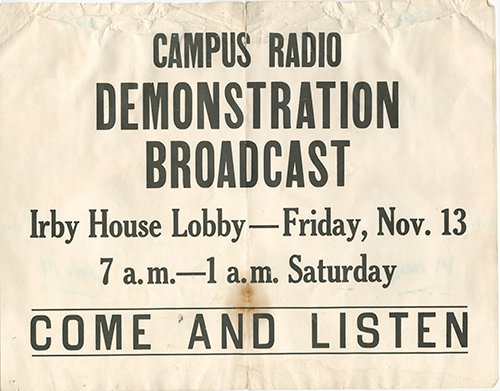
November 13, 1959: First Broadcast
WTUL broadcast for the first time. The test broadcast originated from Irby Hall and was aired on 645AM with station letters WXXX.
As part of WTUL's 2020 50th Annual Rock On Survival Marathon that didn't happen, we'd planned to share a history of the station. The pandemic may have taken away our Marathon, but our history is still ours to share. And here it is.

WTUL broadcast for the first time. The test broadcast originated from Irby Hall and was aired on 645AM with station letters WXXX.
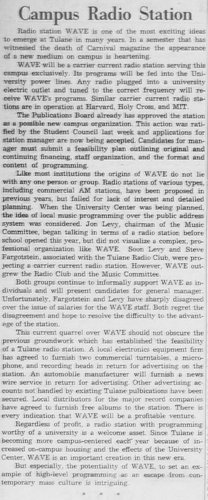
The Hullabaloo stated that "a radio station with programming worthy of a university is a welcome asset" and also gave credit to the many people that made WTUL (still called WAVE in this article) possible.

The 18-hour long demonstration included "fast and slow music but no rock and roll."
General Manager: William Bringier
Business Manager: Phil Scheps
Production Manager: Allan Hewett
Technical Director: Don Andrews
News Director: Edgar Hull
Advertising Director: Jimmy Norr
Staff: Jim O’Neal, Danny Fuller, Mark Heppner, Burt Lovitt, Ken Frankel, William Pearlman, Connie Bradford, May Rush Gwin, Carla Weill, Bruce P. Champagne, Ron Marks
WTUL took to the airwaves with the call letters we love as a fully licensed station. The staff applied to be WAVE but the letters were already in use by a station in Kentucky.
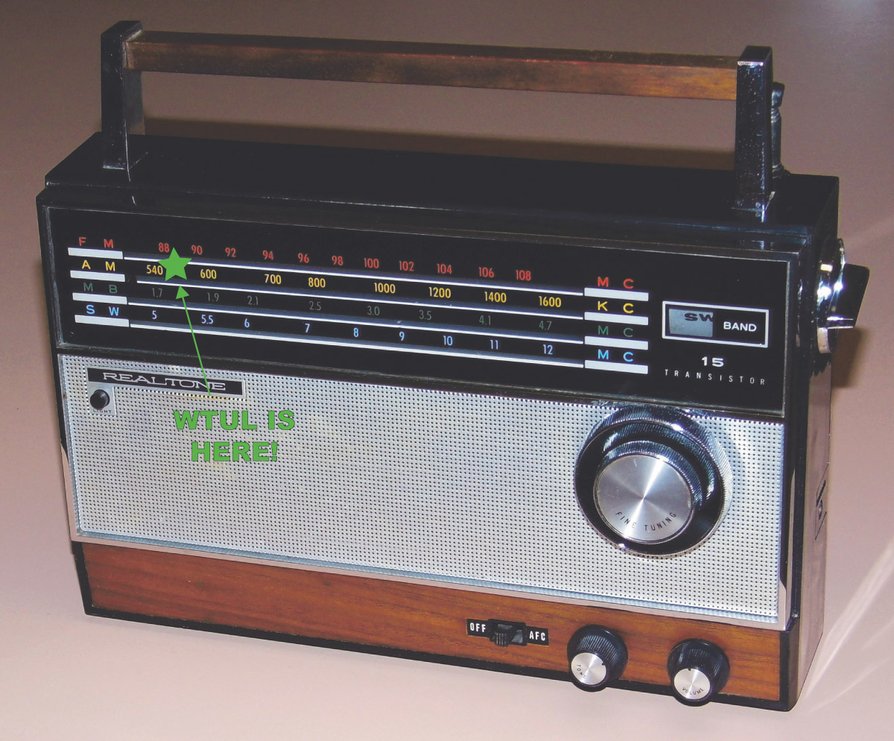
WTUL operated at 550AM and was available in the LBC and the dorms through carrier current (electrical lines). Later, service was extended to reach the fraternity houses through telephone lines.
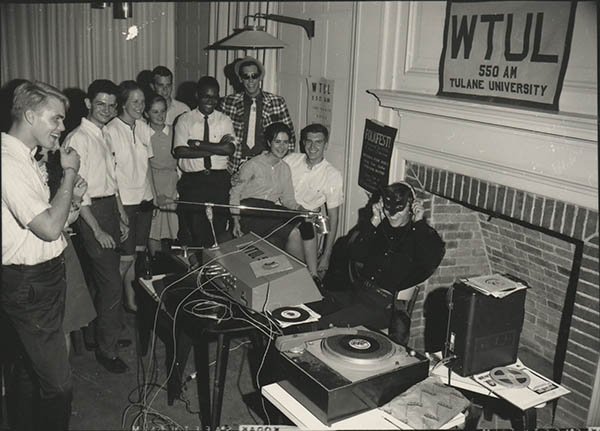
DJs truly embraced their on-air personas. This might be Captain Midnight, a popular voice at WTUL in the early- to mid-’60s. The station hosted remote broadcasts around campus.
WTUL expanded rapidly to include news and current events programming, such as Faculty Forum and live broadcasts of the student council meetings. WTUL covered Tulane sports as well. The Morning Show was broadcast from the UC (now LBC) cafeteria Tuesdays and Thursdays and featured music, and faculty and student interviews.
By September 1960, the station had a studio in the LBC basement (the building was called the University Center at the time). Automation (the automation's DJ name was "Sam Seeburg") kept WTUL on the air from 1 a.m. - 7 a.m. and from 9 a.m. - 4 p.m., but live DJs filled the rest of the schedule.
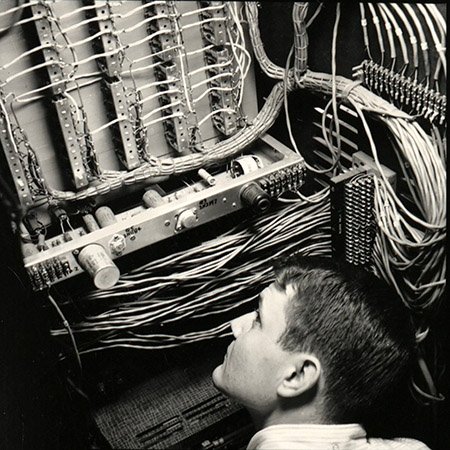
The station’s transmitter burned out in 1964 and WTUL fell silent. WTUL got back on the air shortly after, but it was just one more obstacle to continuous, consistent programming. In 1965, WTUL launched the Mad Money Marathon — DJ Ralph Whelan (The Wolfman) went on the air and vowed to stay there until the station’s request for funds was granted. After more than 18 hours on the air, Whelan was relieved by Jeff Michel, Ron Scott, Jeff Johnson and Mike Weesner in some unknown order. In addition to the DJ's feats of endurance, students protested at the Student Senate meeting, and The Hullabaloo ran a front-page editorial in support of funding for WTUL. It must've worked because the station was granted full funding. This was WTUL’s first Marathon fundraiser, but it didn’t become the fun, annual event known today until 1970.
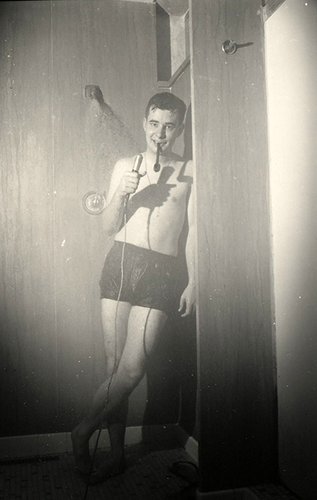
Also in 1964-1965, WTUL Program Director Jeff Michel hosted Showerathon (pictured above) from Monroe Hall. It lasted 6.5 hours!
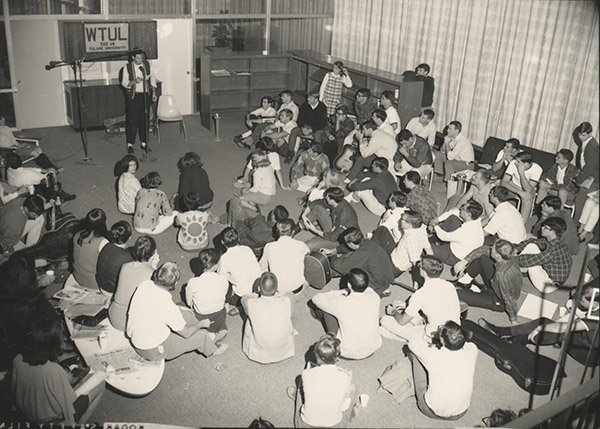
WTUL hosted monthly Folk Fests from the UC which drew in-person audiences of 100-200 people in addition to the larger listening audiences.
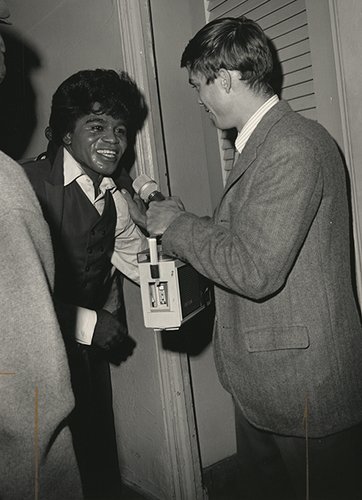
DJs also interviewed celebrities such as James Brown and Bob Hope and news figures such as Louisiana Governor John McKeithen.
Moratorium Day was a national, coordinated day of marches and teach-ins across the US to voice opposition to the Vietnam War. WTUL was one of 11 stations across the country that provided local coverage to the New York University anchor station for the National Moratorium Network. WTUL broadcast a live, nearly hour-long report on Moratorium events in New Orleans that was picked up by stations across the country.
Near the end of the 1960s, WTUL’s music programming shifted more towards rock ‘n’ roll and some listeners wrote letters to the editor of The Hullabaloo complaining about the change.
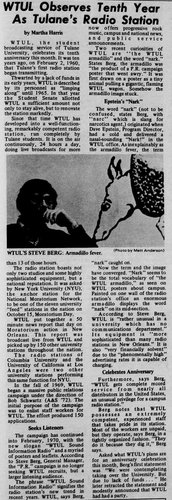
WTUL celebrated its 10th birthday in 1970. General Manager Steve Berg joked that WTUL was "contemplating taking over the University" but settled for having a party instead.
Tulane’s was the second non-commercial educational license to be granted in the New Orleans area — LSUNO’s (now called UNO) for station WWNO was the first. But, WTUL-FM was on the air first. WTUL hit the airwaves using its new, non-commercial FM license Dec. 4, 1971, while WWNO started broadcasting three months later. That makes WTUL is the oldest non-commercial radio station in New Orleans!
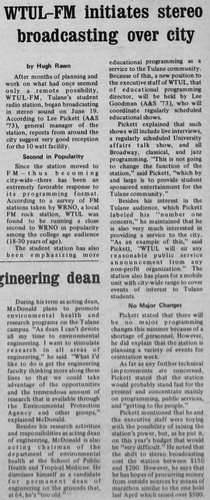
WTUL switched to stereo broadcasting in June 1972 but WTUL’s technological challenges weren’t over. The antenna, located on top of Monroe Hall on the Tulane Uptown campus, broke a few times during the ‘70s but a new antenna solved those problems in 1979.